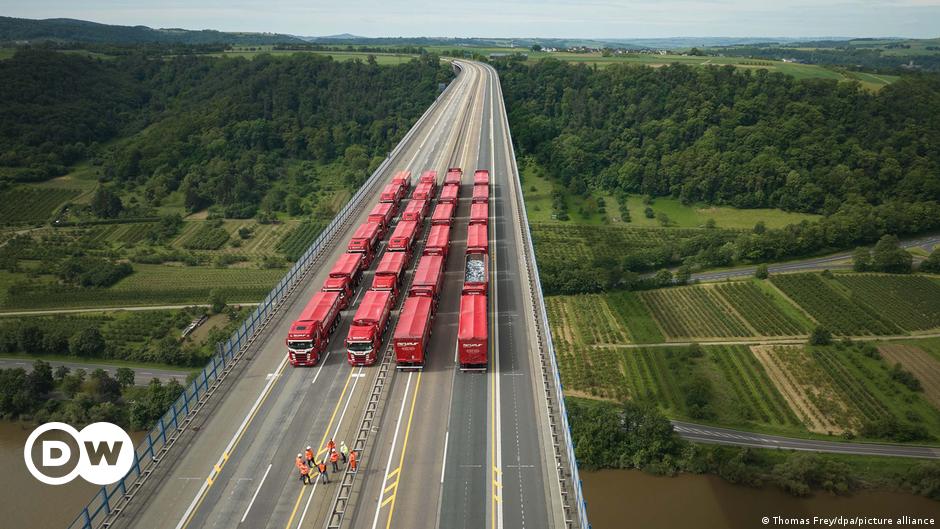- cross-posted to:
- worldnews@lemmit.online
- cross-posted to:
- worldnews@lemmit.online
Honestly this is the problem with all road infrastructure. It’ll be interesting to see how countries like China manage it. China currently has the largest paved-road system in the world, and maintaining that will not come cheap.
Meanwhile, bosses: Imma need you all to come back in to the office…because reasons.
And they have not built their system with long term staging/replacement in mind. A lot of their shorter bridges don’t look like they are designed for staged maintenance. Also, the political will to build is different than the political will to maintain.
This makes one of the “solutions” from the article: “A law was introduced at the end of 2023 that will eliminate the need for permits and environmental impact assessments for bridges that are being widened to add lanes as part of renovations.” look particularly shortsighted. Infrastructure is a maintenance debt that we are reckoning with, so we will make it easier to build specifically bigger infrastructure so that in 25 years we will have an even bigger problem to solve? Not to mention the concept of induced demand meaning that those lanes are going to increase the amount of vehicles using the bridge, which would be exactly the kind of thing that should get an environmental assessment, versus repurposing some lanes for sustainable transit or building a separate bridge for those modes
It will come cheap though and it will probably come twice as fast as anywhere else.
The issue in Germany isn’t so much that infrastructure needs to be maintained but that a lot of the bridges were built more or less at the same time (after ww2) so they’re now failing more or less at the same time (at the end of their lifetime, no surprise there). Usually, a country doesn’t build so much at the same time, so maintenance doesn’t come all at once.
That they aren’t being properly maintained/funded? It looks like a bunch of the bridges that are having issues are mostly due to age.
China’s road infrastructure is all much newer than most other developed nations. And since it was built later I imagine the materials and civil engineering undergirding them is better.
However, the bill always comes due eventually for reinforced concrete. It’s currently coming due in most of the west now from all the freeway building that happened in the 50s.
China still has a long time til they’re in the same place, and it will be interesting to see if they learned the lessons of not deferring maintenance.
The real answer is that most roads are a transient solution as transit gets built out. They should form an auxiliary network, not the backbone of a country’s transportation.
China also had a couple of twists. At least parts of the West have general counterparts to these problems.
Some cities had infrastructure built out ahead of demand. Many of the cities did start filling up with people, which is great. However, the infrastructure aged well ahead of when it was used. So some of the infrastructure is coming due for expensive maintenance, often without a solid tax structure to pay for it. Readers of Strong Towns will recognize this general pattern of overbuilding without building a solid foundation, but it just has a Chinese character to it.
Linked to that is a growing debt crisis at the local government level. The most current estimate I could find is 94 trillion yen (US$13 trillion). Many infrastructure investments were made that are projected to never be paid off in their lifespan. Again, Strong Town readers will recognize this general pattern.
Going from pure speculation, I wonder whether they might have been able to avoid some of the problems with aging unused infrastructure by setting aside land and right-of-way. Here in Portland, when they were planning the I-205 freeway, one concession to transit and bike advocates was to set aside a right-of-way for a transit way and a bike path. That particular concession was made around 1975. The bike path was built immediately. The northern end was used to extend the preexisting light rail to the airport on September 10, 2001 (great timing) as part of the Red Line. The southern end became part of the Green Line later.
It’s true what you said, being newer than most other developed nations.
However at the back of my mind, whenever it says “made in china”, i don’t expect much quality or built to last.
I get that. There was a time when “made in Japan” meant low quality also. Times are a changin’.
Japan buying up all of USA debt and land was a scary Boogeyman.
I think I remember Saudi Arabia doing it too.
Then China.
I wonder if the American empire will last long enough for another country to do it.
the whole made in … thing was originally implemented to mark the inferior products / cheap copys of british products that where made in germany
Germany’s
autobahn bridgesfalling apartThanks to not making any debts. It’s all the infrastructure, I don’t think a single one isn’t about to break down.
I’ve gone nearly insane trying to argue about this with family. How hard is it to see that investment in infrastructure pays dividends in the long run??
Because it requires raising taxes and very few want that. Raise it on just the rich? Even the poor don’t want that because they’re just temporarily embarrassed millionaires.
It does not. Spending money you borrow at an interest rate that’s as low as it currently is, is way, way, way cheaper than going “Oops, sorry, there’s currently no money for roads / bridges / hospitals / Kitas /…” and waiting until they’ve fallen into complete unrepairability, at t which point you’ll have to rebuild for way more money.
And speaking of Kitas: we currently have far too few. This forces some parents to stay at home even though they want to work. Borrow money, build Kita, a sizeable portion of the population returns to the workplace.
Better infrastructure allows people to earn more. More earnings is more taxes collected, without raising them on the individual.
I’m not sure what you’re saying. Are you saying Germany is falling apart because it doesn’t have debt?
Basically. It’s a complicated economy issue. But lets say there’s not just monetary debt, but also structural debt. Our infrastructure is old, a lot has to be repaired by making debts. But they refuse to, thing is, the bridges will collapse at some point, literally, if you don’t build new ones. This will all come back to hunt our economy as no train will deliver, no truck will be able to use the highway as a lot of bridges are broken. Same with schools, you get less educated people, which then on average produce less wealth. In short term you save money, in the long term the world will move on without you. Every economist knows, a little debt is perfect as it works in sync with the capitalism we all live in. However the payment for the dept shouldn’t outgrow the economy, that’s the only rule. Making no new debts sounds good on paper, but no young person will say “thank you” when they grew up with bad education, a broken economy and an inhabitable planet. Now is the best time to make debts to fix big issues.
More like it doesn’t want to get the money to maintain those infrastructure by going into further debt.
I’m not following German politics very closely but the article mentions that this restriction is in their constitution.
There was something in that genre in my province decades ago when a government dedicated itself to ‘zero deficit’ by cutting on infrastructure maintenance for many years. A bridge eventually fell. Classic story. It seems like a common thing.
This is the best summary I could come up with:
Twenty-four bright red trucks had been parked close together in the middle of the wide autobahn bridge at a height of 136 meters (446 feet).
Setting a speed limit and closing it to heavy vehicles could extend a bridge’s life, but even these kinds of restrictions cannot rule out a sudden collapse.
In late 2021, the Rahmede bridge in the state of North Rhine-Westphalia was found to be so badly damaged that it had to be closed due to the risk of collapse.
Although traffic is being diverted over a wide area, thousands of vehicles still pass through the small town of Lüdenscheid and the neighboring villages every day.
A law was introduced at the end of 2023 that will eliminate the need for permits and environmental impact assessments for bridges that are being widened to add lanes as part of renovations.
Wissing thinks he has a way out of the predicament: A new infrastructure fund that the Free Democratic Party (FDP) wants to set up with the help of private capital.
The original article contains 1,059 words, the summary contains 171 words. Saved 84%. I’m a bot and I’m open source!





